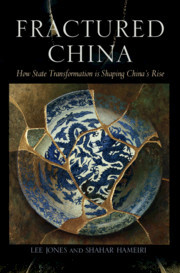Description
Fractured China
How State Transformation Is Shaping China's Rise
Authors: Jones Lee, Hameiri Shahar
Explains how state transformation processes–the fragmentation, decentralisation and internationalisation of China's party-state–shape China's external relations.
Language: English
Subject for Fractured China:
Approximative price 35.47 €
In Print (Delivery period: 14 days).
Add to cart
Fractured China
Publication date: 10-2021
Support: Print on demand
Publication date: 10-2021
Support: Print on demand
Approximative price 96.55 €
In Print (Delivery period: 14 days).
Add to cart
Fractured China
Publication date: 10-2021
280 p. · 15.8x23.5 cm · Hardback
Publication date: 10-2021
280 p. · 15.8x23.5 cm · Hardback
Description
/li>Contents
/li>Biography
/li>
Is China's rise a threat to international order? Fractured China shows that it depends on what one means by 'China', for China is not the monolithic, unitary actor that many assume. Forty years of state transformation ? the fragmentation, decentralisation and internationalisation of party-state apparatuses ? have profoundly changed how its foreign policy is made and implemented. Today, Chinese behaviour abroad is often not the product of a coherent grand strategy, but results from a sometimes-chaotic struggle for power and resources among contending politico-business interests, within a surprisingly permissive Chinese-style regulatory state. Presenting a path-breaking new analytical framework, Fractured China transforms the central debate in International Relations and provides new tools for scholars and policymakers seeking to understand and respond to twenty-first century rising powers. Drawing on extensive fieldwork in China and Southeast Asia, it includes three major case studies ? the South China Sea, non-traditional security cooperation, and development financing?to demonstrate the framework's explanatory power.
Introduction; 1. State transformation and Chinese foreign policy; 2. State transformation and the South China Sea; 3. Chinese non-traditional security governance in the greater Mekong subregion; 4. China's International development financing; Conclusion.
Lee Jones is Reader in International Politics at Queen Mary University of London. His other books include ASEAN, Sovereignty and Intervention in Southeast Asia (2012), Societies Under Siege: Exploring How International Economic Sanctions (Do Not) Work (2015), and The Political Economy of Southeast Asia: Politics and Markets under Hyperglobalisation (2020).
Shahar Hameiri is Australian Research Council Future Fellow and Associate Professor of International Politics in the School of Political Science and International Studies, University of Queensland. Among his recent books are Governing Borderless Threats (2015), International Intervention and Local Politics (2017), and The Political Economy of Southeast Asia (2020).
Shahar Hameiri is Australian Research Council Future Fellow and Associate Professor of International Politics in the School of Political Science and International Studies, University of Queensland. Among his recent books are Governing Borderless Threats (2015), International Intervention and Local Politics (2017), and The Political Economy of Southeast Asia (2020).
© 2024 LAVOISIER S.A.S.
These books may interest you

Will Africa Feed China? 25.06 €



